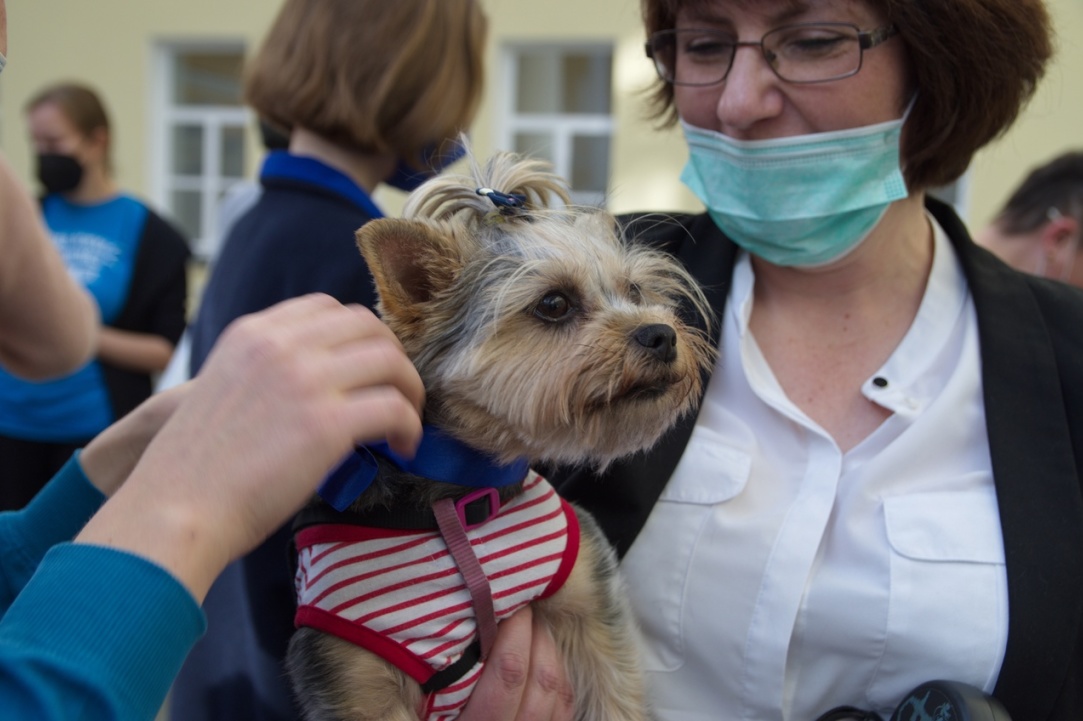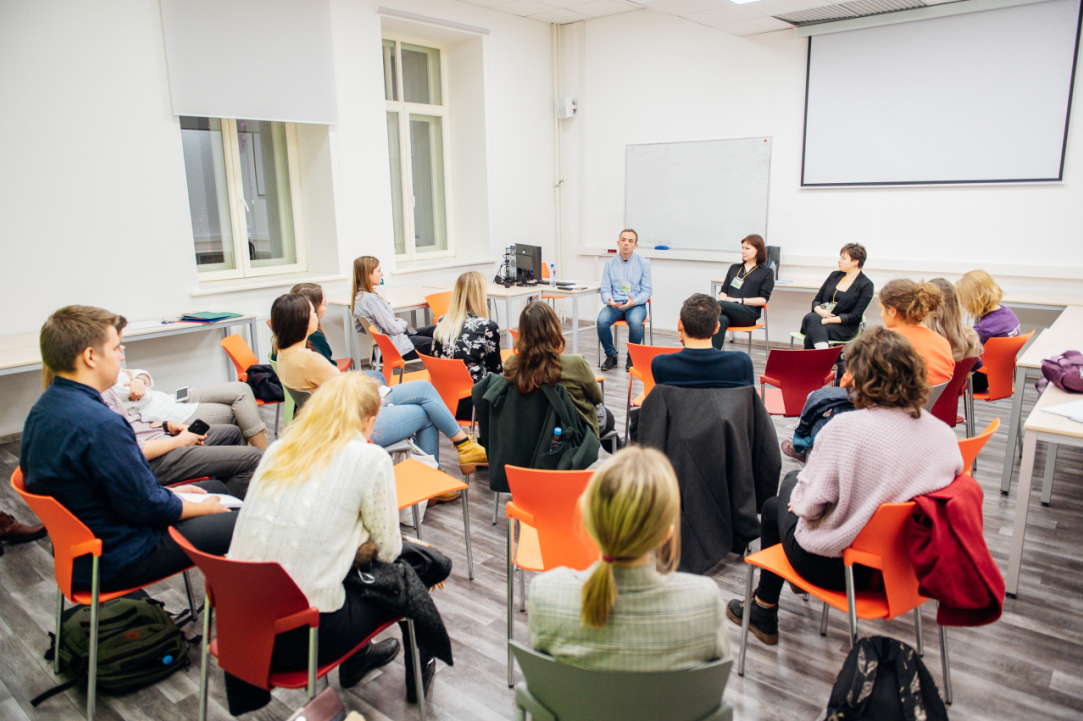Social Adaptation, the Secrets of Communication, and Animal Therapy: Psychological Welcome Week Comes to a Close

In a series of events that ran from September 13–21, psychologists from the HSE University Centre for Psychological Counselling spoke to students about communication traps and establishing trusting relationships, the challenges of adapting to a new environment and the resources required to do so, the university’s emergency psychological service, and animal therapy. The event programme also included English-language events.
The HSE University Centre for Psychological Counselling put together a wide-ranging programme for Psychological Welcome Week. Topics included asserting personal boundaries and reading the emotions of the people you talk to, the challenges of adapting to student life, and how spending time with animals can combat stress and anxiety.

Irina Makarova
Director, HSE University Centre for Psychological Counselling
‘In 2020, Psychological Welcome Week was centred around the fact that the academic year was starting off in a blended format. A lot of students weren’t able to come to Moscow, and had to start their student lives remotely,’ explained Irina Makarova, Director of the Centre for Psychological Counselling. ‘We needed to make an extra effort to introduce them to the university and the services available to them, including the Centre for Psychological Counselling. Last year’s experience shows how necessary and important it is to tell students about how the counselling service works, how it can help them, and how to arrange an appointment.’
This year’s event was devoted to helping HSE students and staff to improve their psychological wellbeing. It was held in a hybrid format, meaning that attendees were able to listen to the centre’s counsellors and ask them questions both in person and online. Some lectures were given in English. Guests of Psychological Welcome Week also learned about some new changes to how the Centre operates.

‘This year, we have changed the appointment system for students wanting to see a counsellor. Frankly speaking, we received a lot of complaints in the past about long waiting times, with students having to wait 3–4 weeks to see someone. The new system is based on self-registration, where students can choose a counselling venue. Online appointments are also available—students can select a suitable time slot,’ Irina Makarova explained.
Welcome Week is an opportunity to introduce students to the centre, its counsellors, and the new appointment system
The event ended on a very relevant topic for current first-year students: ‘Adaptation: How to Support Yourself in Times of Change,’ given by Dina Zafesova, the Centre’s Leading Psychologist. ‘Adaptation is the process of adjusting to a constantly changing environment. It is also the result of how successfully someone is able to adjust to such an environment,’ she explained at the beginning of the meeting. ‘We keep adapting as long as our environment is changing. But sometimes, when the changes are extreme, we get knocked out of this process and experience adaptive stress. This can be accompanied by fluctuating moods, various kinds of aggression, and loss of motivation. This can often happen when we undergo big life changes, such as finishing school and starting university.’
Dina Zafesova, Leading Psychologist, HSE University Centre for Psychological Counselling, pointed out that difficulties are a normal part of the adaptation process, as people need time to adjust to new social settings. And the more changes there are, the harder it can be to adapt. That’s why it’s important to pay attention to our feelings, as well as changes in our behaviour and psychological state.

Dina Zafesova
Leading Psychologist, HSE University Centre for Psychological Counselling
‘We need to be able to see when we’re struggling and when we’re in a state where we don’t know what to do. And instead of chugging along like a train towards goals we’ve set ourselves, we need to pay attention to our difficulties and work to help ourselves.’
She also emphasized that people experiencing a difficult adaptation process need to keep a close eye on their physical and mental reserves. Given the close connection between the body and the mind, it is vital to keep a regular schedule of eating, sleeping, and resting.
If you want to manage your productivity, you first need to take care of your physical and mental wellbeing
Help and support are also important resources. According to Dina Zafesova, simply telling someone else about your problems can help you feel better and reduce stress.
The most important thing is to be aware of how you’re feeling. For example, if you feel like something is wrong, sit down and write about which aspects of your new life are troubling you. ‘You can’t do anything about the situation until you deal with your emotions and worries. But once you figure out what’s making you feel that way, you’ll be ready to work on it. It’s very important to figure out the cause of uncertain and anxious feelings.’
Ms. Zafesova also emphasized the importance of acknowledging when you’re having a hard time, not comparing yourself to other people who might find it easier to adapt, and not setting yourself deadlines to change. It is important to temporarily lower your expectations of what you want to achieve and to allow yourself to relax. ‘You need time to relax and do nothing, otherwise you run the risk of burnout and exhaustion. Our physical and mental reserves are all we have—we can’t get better without them. You should always pay attention to yourself and your immediate reactions to what’s happening,’ she concluded.
See also:
Researchers Present the Rating of Ideal Life Partner Traits
An international research team surveyed over 10,000 respondents across 43 countries to examine how closely the ideal image of a romantic partner aligns with the actual partners people choose, and how this alignment shapes their romantic satisfaction. Based on the survey, the researchers compiled two ratings—qualities of an ideal life partner and the most valued traits in actual partners. The results have been published in the Journal of Personality and Social Psychology.
'I Want Science to Help Me Explore New Horizons'
Eliana Monahhova worked as a journalist for various media outlets, but after realizing she frequently wrote long-form pieces on the psychology of the human brain, she decided to change her career focus. In this interview with the HSE Young Scientists project, she discusses the perception of fake content, shares her dream of meeting Robert Sapolsky, and talks about her upcoming YouTube channel.
Psychologists from HSE University Discovered How Love for Animals Affects Relationships with People
Researchers from HSE University have identified a connection between attachment to pets and attitudes toward nature and other people. The study found that the more joy people derive from interacting with their pets, the more they want to help others. However, love for animals is not always associated with concern for nature. The findings were published in the Social Psychology and Society journal.
Psychologists Study Daydreaming in Russian Cultural Context
Researchers at HSE University, having examined the role of daydreaming in the Russian cultural context, conclude that constructive daydreaming can help people with gaining insight into their life's trajectory, fostering personal growth, discovering existential meaning, enhancing psychological wellbeing, and cultivating a balanced temporal perspective. The study findings have been published in Cultural-Historical Psychology.
Workaholism Helps Young Narcissists Boost New Venture Performance
An international team of researchers including Professor Galina Shirokova, Director of the Strategic Entrepreneurship Centre at HSE University in St Petersburg, and her students Nailya Galieva and Diana Doktorova, examined the impact of narcissism on young entrepreneurs' success. The authors have demonstrated that a company founder's workaholism can amplify the influence of narcissism on a new venture's performance.
Plurilingualism Compensates for Low Extraversion in Nurturing Creative Skills
Researchers at the HSE Laboratory for Linguistic, Intercultural, and Creative Competencies have examined the role of the Big Five personality traits in moderating the development of creativity among individuals who use multiple languages and have intercultural experiences. It has been found that acquiring multiple languages and engaging with diverse cultures can enhance an individual's creativity and compensate for some deficiencies in communicative abilities. That said, language practices are likely to foster creativity only in mentally stable individuals. The paper has been published in the International Journal of Bilingual Education and Bilingualism.
Attainment of Happiness in Psychologically Mature Individuals Linked to Pursuit of Meaning
Austrian psychiatrist Viktor Frankl believed that the quest for meaning constitutes a fundamental and intrinsic motivation for all human beings. Some other authors suggest that the need for meaning or purpose only emerges at higher levels of personality development. According to a team of psychologists from HSE and the University of Paris Nanterre, individuals who have achieved higher levels of ego development are inclined to relinquish hedonistic motives in favour of cultivating mindfulness and embarking on a quest for meaning. These findings have been published in Frontiers in Psychology.
Married Men Less Prone to Workplace Burnout
Greater marital satisfaction lowers the risk of professional burnout, with this correlation being more pronounced among men than women. This is a conclusion made by HSE psychologists after conducting a study on the effect of social interactions on workplace burnout on a sample of 203 employees from several Russian companies. According to the researchers, gaining a better understanding of the specific aspects of burnout experienced by individuals makes it possible to address this syndrome more effectively. The paper has been published in Organizational Psychology.
HSE Psychologists Propose New Approach to Building Soft Skills
Researchers at HSE's School of Psychology have used the findings of studies into creativity and multilingualism to develop 'Plurilingual Intercultural Creative Keys’ (PICK), a new programme which integrates both aspects into the teaching and learning process. The study results have been published in Psychology. Journal of the Higher School of Economics.
Card File: Plurilingual Creativity
Fluency in foreign languages has multiple advantages in terms of cognitive abilities, communication skills, cultural awareness, and career advancement. But can bilingualism and plurilingualism (knowledge of multiple languages and related cultural contexts) contribute to creative thinking and one's ability to generate new ideas? Studies have shown that linguistic, intercultural and creative competencies are interrelated, and their synergy can give rise to plurilingual creativity. The following overview is based on several papers by Anatoly Kharkhurin, Director of the HSE Laboratory for Linguistic, Intercultural and Creative Competencies.


